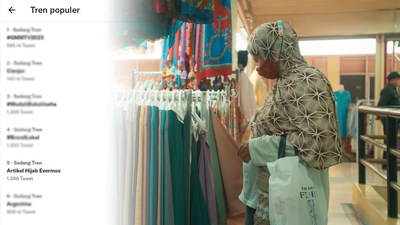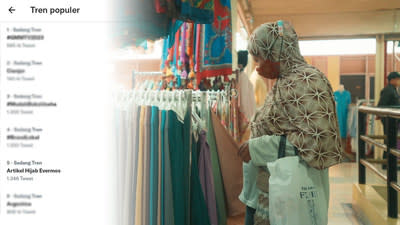BANDUNG, Indonesia, Dec. 14, 2022 /PRNewswire/ — The recent data from the World Economic Forum (WEF) showed that in average, people in Indonesia spend $6.09 to buy more than 1.02 billion pieces of hijab every year. But unfortunately, the majority share of the market, at around 75%, is dominated by imported products. Ever since social commerce Evermos unveiled this situation in the WEF article, this rueful fact has been the subject of heated conversation across different platforms and caught the attention of a number of community figures.
As among the world’s largest Muslim population, the Muslim modest fashion market in Indonesia is huge. Arsjad Rasjid, Chairman of the Indonesian Chamber of Commerce & Industry (KADIN Indonesia) shared his thought on the article in his own piece, “There are more than enough proofs showing how big the Indonesian modest Muslim fashion market is. Over the last decade, our country has dominated as the qibla for the world’s modest Muslim fashion, and throughout 2022, we’ve hosted numerous Muslim fashion weeks and events on both national and international level.”
“But why local products only get 25% of the market share? Cheap imports have dominated the market. They’re enjoying low import tariffs and minimum barriers to entry, and especially with the ease of consumers ordering from international e-commerce platforms,” explained Arsjad Rasjid.
Anwar Abbas, Deputy Chairman of the Indonesian Ulema Council (MUI) who is a renowned Islamic economic scholar commented, “This is undoubtedly very burdensome to our foreign exchange reserves and will also greatly affect and harm domestic businesses.”
In line with Arsjad Rasjid and Anwar Abbas, Sandiaga Uno, Minister of Tourism and Creative Economy (Menparekraf), also responded to the WEF article that was written by Evermos. “We must take over the market control and reign in our own country. This is a huge business potential and also a chance to create as much job opportunities as possible, therefore we need to seize and optimize it.”
All related stakeholders need to join hand and make action to help local products win the domestic market
Both Anwar Abbas and Arsjad Rasjid agreed that to take over the hijab market in Indonesia, it takes multisector collaboration that involves everyone from the businesses, the government, the civil societies, to the consumers.
Anwar Abbas pointed out, “First of all, local hijab and modest fashion businesses need to improve their creativity and efficiency in production. We need to be able to produce more appealing products with better quality yet at a cheaper price compared to the imported ones.”
Resonating with Abbas’ idea, Arsjad Rasjid explained that KADIN is carrying out several entrepreneurship empowerment programs, which are expected to encourage aspiring entrepreneurs and MSMEs to scale up their production and capture a wider market base.
A similar effort was made by Evermos, the author of the WEF article being discussed. Ghufron Mustaqim, CEO and Co-founder of Evermos, said “By connecting local brands with our network of hundreds of thousands of active resellers throughout Indonesia, Evermos aims to help entrepreneurs expand their market from Sabang to Merauke.”
Anwar Abbas further elaborated, “Next, we expect the government to provide consistent support and attention to the hijab and modest fashion industry in order to enable local businesses to thrive in the domestic hijab market.”
With regard to this, Sandiaga Uno explained that the Ministry of Tourism & Creative Economy (Kemenparekraf) will continue supporting the growth of the creative economy sector, including by providing various incentives and facilities and through numerous programs such as the Apresiasi Kreasi Indonesia (Appreciation for Indonesia’s Creations) and the Gerakan Nasional Bangga Buatan Indonesia (National Movement for Proud of Locally Made Products) programs.
“Just claiming that you are proud of the local products will not be enough, you need to be proud of buying and wearing local creative products. Local pride! That’s the attitude that we need to instil in order to create real and direct impact on the public,” stressed Sandiaga Uno as he called on the Indonesian people to use more local products.
The projected global Muslim fashion market of USD 313 billion is a huge potential for Indonesia
Referring to WEF data, the global market for Muslim modest fashion including hijab grew 5.7% from $279 billion to $295 billion in 2021. The market value is estimated to continue growing and is projected to increase by 6% or the equivalent of $313 billion in 2022.
Commenting on this, Sandiaga Uno said, “This projection shows just how huge the potential of the world hijab market. That being said, local businesses in Indonesia must win the domestic market in order to create the domino effect in the form of more employment opportunities and wider business opportunities.”
Anwar Abbas underlined that when domestic hijab products can compete well in the global market, the country’s foreign exchange reserves will increase and Indonesia will gain stronger position in the global competition. In turn, it is expected to attract more foreign tourists and expatriates to come to Indonesia and make domestic transactions such as business, tourism or shopping. “If we can realize this, we will be able to create strong positive impact on the growth and development of the national economy,” explained Anwar Abbas.
Complete documentation on this article can be accessed from this link.
About Evermos
Evermos is the number 1 social commerce platform in Indonesia (based on research by Populix) for resellers selling various products from MSMEs and local brands to consumers. Committed to supporting the Government to create an inclusive economy, digital transformation, and job creation, Evermos is paving the way for all elements of society beyond Tier 1 cities who want to earn extra income by becoming a reseller just for free through one application away.
Evermos presents a one-stop application that provides product interfaces, catalogs (sales & marketing kits), digital payment pages, and logistics. Evermos also enables resellers to foster their knowledge and skills in sales and marketing through regular and continuous training from professional trainers. Currently, Evermos has empowered more than 500,000 active resellers across Indonesia and cooperated with more than 1000 brand partners who are 100% locals.
In 2021, Evermos managed to raise $30 million Series B funding. It was also nominated as the Forbes Asia 100 to Watch in the Asia-Pacific region due to its capability to deliver social change and scale up despite the pandemic. Evermos is also a member of the Global Innovator for the World Economic Forum and actively participates in the discussions of the world economy, especially in the MSME sector.
In 2022, Evermos has managed to collect five achievements at once: Forbes 30 Under 30 Asia, winner of the International 3G Championship Award for Women Empowerment by Cambridge IFA in Dubai, becoming part of Endeavor Entrepreneur after thorough and tight evaluation process, win special commendation in The 2022 Transformational Business Awards from Financial Times and International Finance Corporation (part of World Bank Group) for Gender-lens Finance category, and 2022 UN Women Indonesia Women Empowerment Principles Award for Transparency and Reporting category.
To find out more about Evermos’s products and services, please visit the official website page at https://evermos.com/home/
SOURCE Evermos




